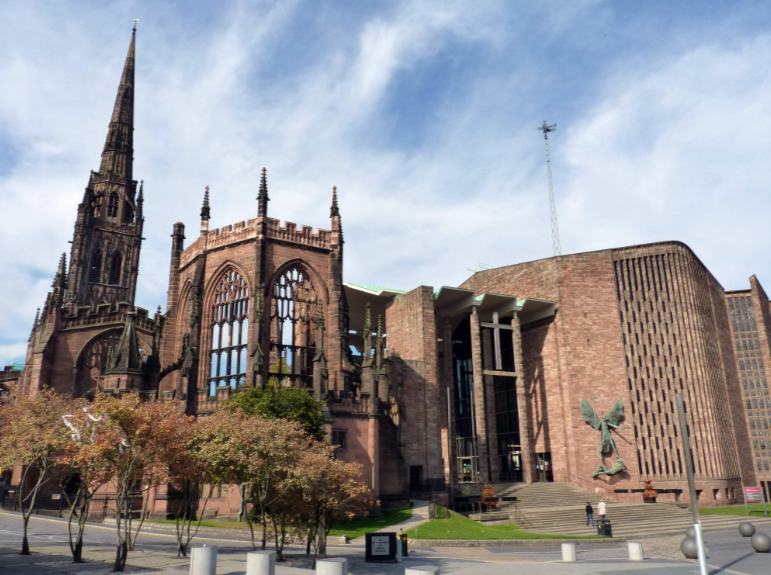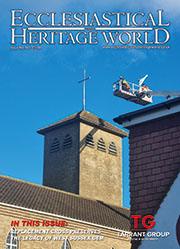39 cathedrals to benefit from First World War Centenary Cathedral Repairs Fund
 Thirty-nine grants totalling £14.5 million have today been announced by government for urgent repairs to Church of England and Catholic cathedrals in England. This is the second phase of grants awarded by the First World War Centenary Cathedral Repairs Fund.
Thirty-nine grants totalling £14.5 million have today been announced by government for urgent repairs to Church of England and Catholic cathedrals in England. This is the second phase of grants awarded by the First World War Centenary Cathedral Repairs Fund.
Welcoming the announcement Dame Fiona Reynolds, Chair, Cathedrals Fabric Commission for England, said: 'Cathedrals are the beating hearts of their communities, offering sanctuary, beauty, collective history, and social and economic support to people of every generation. Cathedrals which benefitted from the first phase of this fund have been repaired and refurbished, and staff and volunteers have time and resources to serve their cities and regions with renewed energy. It is fantastic that more cathedrals are now able to benefit from this scheme. England's cathedrals are a wonderfully diverse group, encompassing not only vast, world-famous medieval buildings such as Durham, Lincoln and Canterbury, but also smaller churches like Wakefield and Leicester which were made cathedrals to serve the growing urban populations of the industrial revolution. These too have become jewels in the centres of their cities and their showcase to the entire nation, as we saw with Leicester Cathedral's events around the re-interment of Richard III.'
Thirty-two Church of England cathedrals will receive between £15,000 to £870,000. The most common repairs are:
Roof repairs - Lichfield, Derby, Guildford, Sheffield, Liverpool, Rochester, Hereford, Carlisle, Southwell, Canterbury, Lincoln - ranging from to £250,000 (Canterbury) to £750,000 (Derby)
Restoration of stained glass windows - Winchester, Wakefield and Worcester - ranging from £390,000 (Worcester) to £500,000 (Winchester).
Stone work at Lichfield, St Albans, Gloucester, Salisbury, York, Ripon, and Leicester - ranging from £160,000 (Chichester) to £550,000 (Salisbury).
The largest grant of £870,000 goes to Coventry Cathedral for re-fixing the exterior slates of the Chapel of Unity, dedicated in 1962 and circular in shape like a nomadic tent, which was designed by Sir Basil Spence. The exterior walls are clad with green Westmorland Slate, contrasting with the pink sandstone of the Cathedral, but the area has been fenced off for many years because of the danger of falling slates. The Chapel area, established as a space where Christianity's many denominations could meet to seek unity and reconciliation, is a natural meeting place for visitors as they move from the ruins of the old cathedral, which was heavily bombed during the Second World War, to the new cathedral. It is also the backdrop to a number of events and activities, including those planned to remember the centenary of the First World War.
Other cathedrals to receive funding include:
Salisbury, whose grant will fund the final phase of the Cathedral's 30-year Major Repair Programme, completing work on the Trinity Chapel, one of the earliest parts of the 13th-century cathedral;
Gloucester, whose grant complements funding from the HLF for developing community and precinct facilities and installation of solar panels on the nave roof, allowing high level stone repairs to take place. The cathedral's own stonemasons, including apprentices, will carry out the work
Wakefield, where completion of repairs to windows will be the final phase in the complete refurbishment of the cathedral. Wakefield Cathedral has doubled its visitor numbers since completing an Heritage Lotter Fund project in 2014.
Secretary of State for Culture, Media and Sport, Karen Bradley said: "Cathedrals are powerful symbols of Britain's shared history. They are important not only for their architecture and heritage, but also for the vital role they play in local communities. I am delighted that the First World War Centenary Cathedral Repairs Fund will ensure that these wonderful cathedrals remain in a good state of repair and are preserved for future generations."
The Church of England's cathedrals are estimated to contribute around £220 million to the national economy every year through employment and tourism. They welcome more than 11 million visitors annually, employ more than 7,000 people and are supported by 15,000 dedicated volunteers.
Sir Paul Ruddock, Chair of the Expert Panel of the First World War Centenary Cathedral Repairs Fund, which assesses the grant applications, said: 'In 2014 the Chancellor announced the first £20 million phase of the Fund, intended to get our wonderful heritage of Cathedral buildings waterproof and weathertight, safe and open and in good shape for the commemorations of the First World War Centenary in which they are playing such a key part. I and all those who love these great buildings were delighted when he announced a further £20 million for the Fund in the March 2016 budget. It will now run until 2018 and the works it will have supported between 2014 and 2018 will stand as a very fitting memorial to the First World War a century earlier'.
Full list of recipients below:
First World War Centenary Cathedral Fabric Repairs Fund - Phase 2 1st Round 2016
| Cathedral | Project | Grant Awarded |
| Bradford | Heating system & asbestos removal | £127,000 |
| Canterbury | Library corridor roof | £250,000 |
| Carlisle | Nave and nave aisle roof | £400,000 |
| Chester | Repairs to flooring and emergency lighting | £120,000 |
| Chichester | Cloister repairs | £160,000 |
| Clifton RC | Internal repairs and infrastructure | £700,000 |
| Coventry | Chapel of Unity exterior slates | £870,000 |
| Derby | Nave roof repair | £750,000 |
| Durham | Belfry repairs | £599,000 |
| Ely | Emergency rewiring | £150,000 |
| Exeter | North side drainage and west front apron investigations | £170,000 |
| Gloucester | High level repairs | £486,000 |
| Guildford | Quire/presbytery roof, repointing, asbestos removal | £499,000 |
| Hereford | North aisle roofs | £420,000 |
| Leicester | South face stonework | £300,000 |
| Lichfield | Chapter House stonework and roof | £690,000 |
| Lincoln | Triforium roof and north-west Transept | £480,000 |
| Liverpool | Nave roof phase 2 | £460,000 |
| Liverpool Met RC | Repairs to approaches and main entrance | £369,000 |
| Newcastle | Crypt and east end damp investigation | £25,000 |
| Norwich | Electrical infrastructure | £190,000 |
| Nottingham RC | Phase 2 drainage | £115,000 |
| Peterborough | Repairs to four windows | £15,000 |
| Plymouth RC | Stonework and window repairs | £644,000 |
| Portsmouth | North side windows and other works | £240,000 |
| Ripon | Presbytery stonework repairs | £398,000 |
| Rochester | Eastern roof repairs | £460,000 |
| Salford RC | High level repairs and access | £373,000 |
| Salisbury | Trinity Chapel stonework | £500,000 |
| Sheffield | Nave, south and north aisle roofs | £480,000 |
| Sheffield RC | Spire repairs - phase 2 | £189,000 |
| Southwell | South quire aisle roof | £291,000 |
| St Albans | External stonework | £230,000 |
| St Pauls | Stone Gallery repairs | £200,000 |
| Wakefield | Nave windows | £456,000 |
| Westminster RC | Organ chamber roofs | £300,000 |
| Winchester | Repair and conservation of major windows | £500,000 |
| Worcester | Great West Window repairs | £390,000 |
| York Minster | Quire south side and Lady Chapel stone repairs | £500,000 |
| 39 grants | TOTAL | £14,496,000 |
Statistics for Phase 2 1st Round
TOTAL to all cathedrals in this round - £14,496,000
TOTAL successful applications - 39
TOTAL to Catholic Cathedrals - £2,690,000
TOTAL to Anglican cathedrals - £11,806,000















